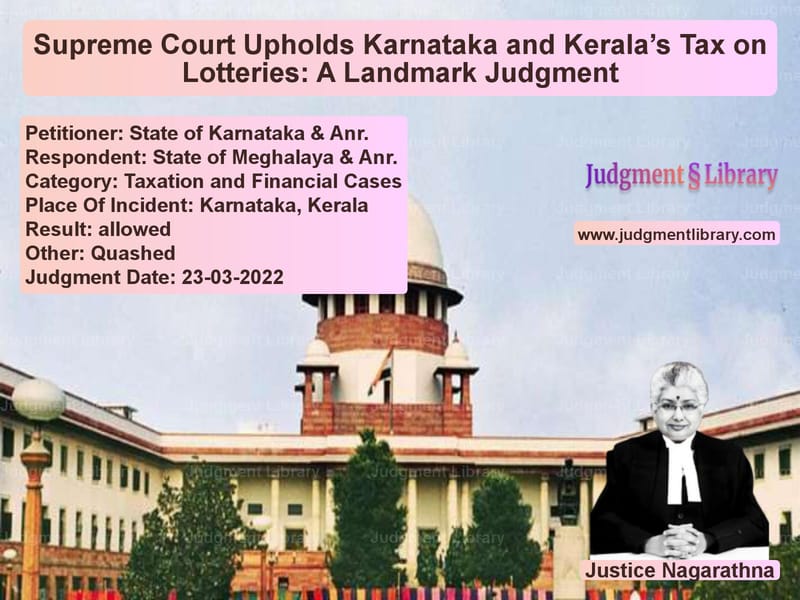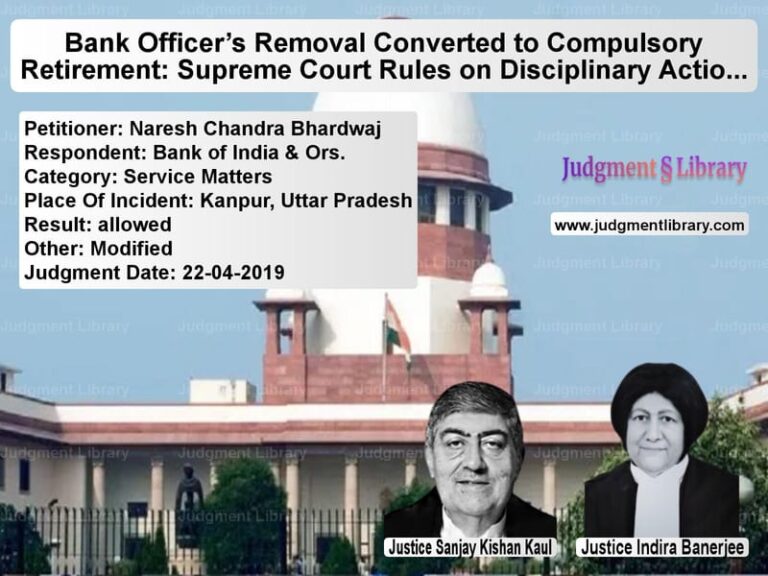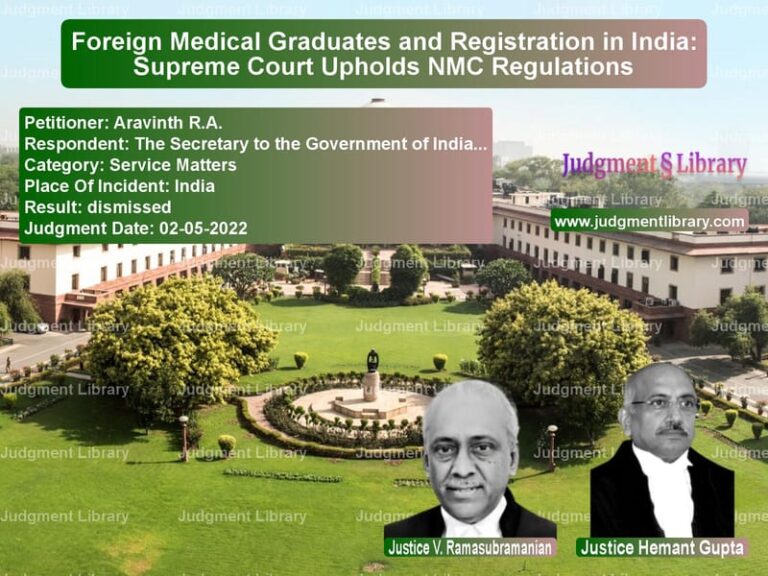Supreme Court Upholds Karnataka and Kerala’s Tax on Lotteries: A Landmark Judgment
The case of State of Karnataka & Anr. vs. State of Meghalaya & Anr. addresses the fundamental question of whether State legislatures have the power to tax lotteries conducted by other States within their territory. The Supreme Court’s ruling clarifies the legislative competence of States to levy such taxes under the Constitution.
The dispute arose after the Karnataka and Kerala legislatures enacted laws imposing taxes on lotteries operated within their States by other State governments. Several High Courts ruled against these laws, prompting the appeals to the Supreme Court. The Supreme Court’s judgment reaffirmed the States’ authority to tax all forms of gambling, including lotteries, conducted within their territory.
Background of the Case
The appeals were filed by the States of Karnataka and Kerala, challenging the High Court judgments that struck down their respective lottery tax laws. The primary legal issues revolved around:
- The interpretation of ‘betting and gambling’ under Entry 34 of List II of the Constitution.
- The legislative competence of States to impose taxes on lotteries under Entry 62 of List II.
- The scope of the Parliament’s power under Entry 40 of List I, which covers lotteries organized by the Government of India or a State.
The dispute originated when Karnataka and Kerala enacted laws taxing lotteries operated by other States within their borders. These taxes were challenged by the affected States, including Nagaland, Sikkim, and Meghalaya, which argued that only the Parliament had the authority to regulate and tax lotteries conducted by a State.
Arguments Presented by the Petitioner (State of Karnataka & Kerala)
The States of Karnataka and Kerala contended that:
- Taxing lotteries falls within their legislative competence under Entry 62 of List II, which includes ‘taxes on betting and gambling.’
- Lotteries, regardless of the entity conducting them, are a form of gambling and should be subject to State taxation.
- The power to regulate lotteries under Entry 40 of List I does not include the power to impose taxes, as taxation is a separate legislative field.
- Allowing other States to conduct untaxed lotteries within Karnataka and Kerala would violate the principle of fiscal federalism.
Arguments Presented by the Respondents (State of Nagaland, Sikkim, Meghalaya, etc.)
The respondent States argued that:
- Lotteries organized by a State fall under Entry 40 of List I, meaning that only Parliament has the authority to legislate on them.
- Taxing these lotteries at the State level would lead to double taxation and disrupt uniformity.
- The tax effectively functions as a sales tax on lottery tickets, which is unconstitutional under the precedent set by Sunrise Associates v. Government of NCT of Delhi.
- Requiring other States to pay taxes in advance creates an economic burden that makes it unfeasible to conduct lotteries outside their home States.
Supreme Court’s Observations and Verdict
The Supreme Court held that:
- Lotteries are a species of gambling, and gambling activities fall within the domain of State legislation under Entry 34 of List II.
- While Entry 40 of List I gives Parliament the power to regulate lotteries conducted by the Government of India or a State, it does not grant Parliament the exclusive power to tax such lotteries.
- Entry 62 of List II, which empowers States to impose ‘taxes on betting and gambling,’ applies to all forms of gambling, including State lotteries.
- As long as a State permits a lottery to be conducted within its territory, it has the authority to impose a tax on such an activity.
Legal Precedents Considered
The Supreme Court referenced multiple judgments, including:
- RMD Chamarbaugwala v. State of Mysore: Held that gambling is res extra commercium and not a fundamental right.
- H. Anraj v. Government of Tamil Nadu: Distinguished between lotteries as actionable claims and their sale as a taxable transaction.
- Sunrise Associates v. Government of NCT of Delhi: Confirmed that lottery tickets are not ‘goods’ but represent an actionable claim.
- B.R. Enterprises v. State of U.P.: Clarified that State lotteries remain within the realm of gambling despite being government-regulated.
Supreme Court’s Decision
Based on its findings, the Supreme Court ruled:
- The appeals of Karnataka and Kerala are allowed.
- The judgments of the Karnataka and Kerala High Courts are set aside.
- The tax laws enacted by Karnataka and Kerala are valid and within their legislative competence.
- Other States conducting lotteries within Karnataka and Kerala must comply with these tax laws.
Impact of the Judgment
This ruling has significant implications:
- It reaffirms the power of State legislatures to tax gambling activities, including lotteries conducted by other States.
- It ensures a level playing field for all gambling activities conducted within a State.
- It clarifies that taxation is distinct from regulation, and the mere inclusion of lotteries in Entry 40 of List I does not exclude them from taxation under Entry 62 of List II.
- It sets a precedent that other States seeking to conduct lotteries in Karnataka and Kerala must comply with their tax laws.
By upholding Karnataka and Kerala’s lottery tax laws, the Supreme Court has reinforced the constitutional division of legislative powers and protected the financial interests of States in regulating gambling activities within their borders.
Petitioner Name: State of Karnataka & Anr..Respondent Name: State of Meghalaya & Anr..Judgment By: Justice Nagarathna.Place Of Incident: Karnataka, Kerala.Judgment Date: 23-03-2022.
Don’t miss out on the full details! Download the complete judgment in PDF format below and gain valuable insights instantly!
Download Judgment: state-of-karnataka-&-vs-state-of-meghalaya-&-supreme-court-of-india-judgment-dated-23-03-2022.pdf
Directly Download Judgment: Directly download this Judgment
See all petitions in Tax Evasion Cases
See all petitions in Banking Regulations
See all petitions in Judgment by B.V. Nagarathna
See all petitions in allowed
See all petitions in Quashed
See all petitions in supreme court of India judgments March 2022
See all petitions in 2022 judgments
See all posts in Taxation and Financial Cases Category
See all allowed petitions in Taxation and Financial Cases Category
See all Dismissed petitions in Taxation and Financial Cases Category
See all partially allowed petitions in Taxation and Financial Cases Category







